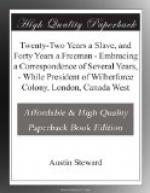It had cost some ten thousand dollars; and had been warranted by the builders to stand one year. How great then must have been the loss and disappointment when in a little more than twenty-four hours after the time specified, the ruins of that beautiful structure were found floating on the broad bosom of the Genesee! And yet when we take into consideration the vast amount of human life which hourly passed over its solid surface, we can but wonder at the intervention of a kind Providence which prevented any loss of life at the time of its fall. A child had but just passed over it, when with one general crash it sank to the waters below; mocking in its rapid flight, the wisdom of the architect and foresight of frail humanity. The fall of Carthage bridge was indeed a calamity felt by the public generally, and sounded the death-knell of all future greatness to Carthage, or at least for some years to come.
About this time the village was thrown into a state of excitement by the arrest of a colored woman named Ellen, who it was charged had escaped from service due to a Mr. D., south of Mason and Dixon’s Line. She had been arrested in accordance with a law passed by Congress in 1793, which forbids persons owing service in one State to flee to another; and which also obliges those receiving such service, to render to the claimant any fugitive from labor due, &c. Poor Ellen! She had many friends and able counsel, but nothing short of an open violation of the law of the land, could prevent her return to the house of bondage. She was tried and given up to him who claimed dominion over her. Hopeless and heart-broken, she was escorted from the boasted land and village of freedom, by a company of the “Light Horse,” under the command of Capt. Curtis. One poor, persecuted slave woman, upon whose heart had fallen a shadow darker than death’s; driving every earthly hope of liberty from her wounded spirit; helpless and forlorn! She indeed must have required this military parade—this show of power! And that too, by men who throw up their caps with a shout for freedom and equal rights! Oh, “consistency, thou art a jewel!”
As I recollect but one other incident of the kind occurring in Rochester, I will now name it.
A colored man named Davis, generally known as “Doctor Davis,” with a reputation unsullied for industry, truth and sobriety, was arrested as a fugitive from slave labor in Kentucky. Two men came on from that State, acting in the double capacity of agents for the claimant and witnesses against the slave. They employed Mr. L. as counsel, and hastened on the trial of the afflicted African. When it became generally known that Davis was arrested, and about to be tried, the excitement grew intense among all classes; but more particularly among the colored people. When the trial came on, the Court room was crowded to overflowing, and every avenue leading to it densely thronged with deeply anxious persons, assembled to




